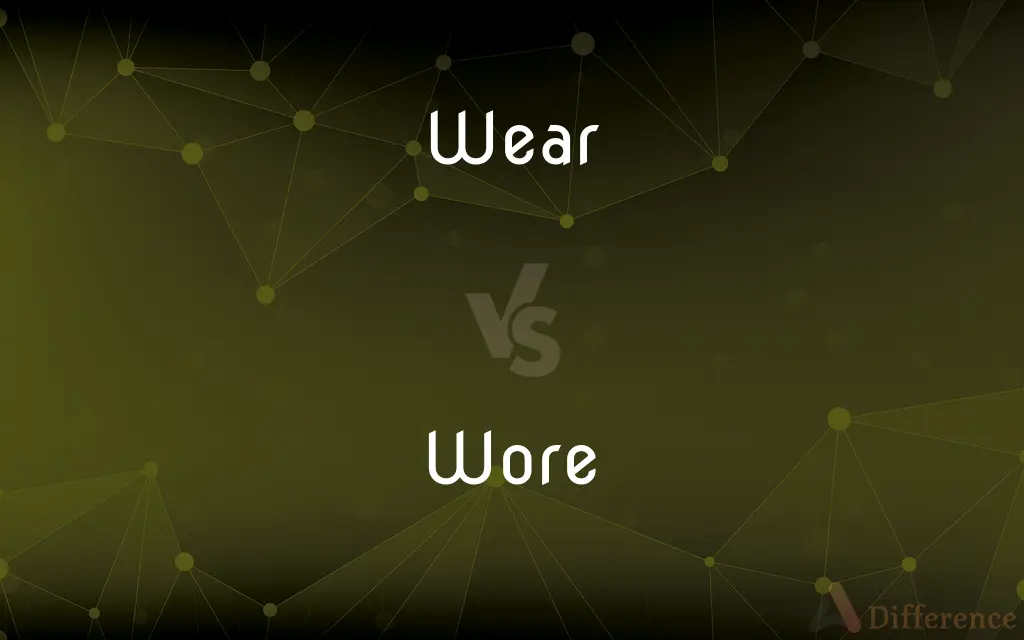Wear vs. Wore — What's the Difference?
By Tayyaba Rehman & Fiza Rafique — Updated on April 1, 2024
"Wear" functions as present tense form, denoting the act of using or having clothing on one's body in the current moment, while "wore" is simple past tense of "wear," indicating that the action of using clothing or an accessory took place in the past.

Difference Between Wear and Wore
Table of Contents
ADVERTISEMENT
Key Differences
"Wear" is used when discussing the act of putting on or having clothes, accessories, or even a particular expression, in the present or as a habitual action. It implies that the action is current or ongoing. For instance, saying "I wear glasses for reading" suggests a regular, possibly daily, occurrence. On the other hand, "wore" refers to a specific instance or instances in the past when someone had something on their body. Saying "I wore a blue dress to the party last night" specifies an action completed at a past time.
The use of "wear" versus "wore" can significantly affect the meaning of a sentence by altering its time frame. "Wear" can also be used in continuous forms to indicate ongoing actions in the present or future, such as "I am wearing my new shoes tomorrow." In contrast, "wore" can only represent actions that have already happened and are not ongoing.
In addition to their primary meanings, both "wear" and "wore" can extend beyond clothing to describe enduring or exhibiting characteristics, effects, or expressions. For example, "wear" can imply bearing a burden or showing signs of use, as in "This sofa wears the marks of many years of use," while "wore" might convey a past state or condition, such as "He wore a look of surprise."
While "wear" is directly related to the present and can suggest future intentions when used with supporting context, "wore" is firmly anchored in the past, denoting actions or states that have concluded. Understanding the distinction between these two forms is crucial for accurate and clear communication about when actions occur or occurred.
Comparison Chart
Tense
Present
Past
ADVERTISEMENT
Usage
Indicates current or habitual action of having clothes or accessories on one's body.
Indicates that the action of having clothes or accessories on one's body happened in the past.
Examples
"I wear a watch every day."
"I wore a watch to the interview yesterday."
Continuous Form
Can be used in continuous forms to indicate ongoing actions.
Cannot be used in continuous forms; strictly past.
Extended Meaning
Can imply endurance or exhibiting signs of use or character in the present.
Can describe past states, conditions, or expressions.
Compare with Definitions
Wear
To have clothing, accessories, or a particular look on one's body.
I wear a uniform to work.
Wore
Used to describe a past habit of using or displaying something.
She wore her hair short when she was younger.
Wear
Implying the use or display of something as a habit.
She wears her hair long.
Wore
Had clothing, accessories, or a particular look on one's body in the past.
He wore his new suit to the wedding.
Wear
To show signs of use or aging.
This jacket wears well, despite its age.
Wore
Bore or displayed an expression or characteristic in the past.
She wore a look of astonishment.
Wear
To bear or display an expression or characteristic.
He often wears a serious expression.
Wore
Showed signs of use or aging in the past.
The old table wore marks from years of use.
Wear
Indicating the action of causing wear or damage through use.
Heavy usage wears the fabric.
Wore
Indicated the action of causing wear or damage through past use.
Years of sunlight wore the paint off.
Wear
Wear is the damaging, gradual removal or deformation of material at solid surfaces. Causes of wear can be mechanical (e.g., erosion) or chemical (e.g., corrosion).
Wore
Past tense of wear.
Wear
To carry or have on one's person as covering, adornment, or protection
Wearing a jacket.
Must wear a seat belt.
Wore
Past participle of wear
Wear
To carry or have habitually on one's person, especially as an aid
Wears glasses.
Wear
To display in one's appearance
Always wears a smile.
Wear
To bear, carry, or maintain in a particular manner
Wears her hair long.
Wear
To fly or display (colors). Used of a ship, jockey, or knight.
Wear
To damage, diminish, erode, or consume by long or hard use, attrition, or exposure. Often used with away, down, or off
Rocks worn away by the sea.
Shoes worn down at the heels.
Wear
To produce by constant use, attrition, or exposure
Eventually wore hollows in the stone steps.
Wear
To bring to a specified condition by long use or attrition
Wore the clothes to rags.
Pebbles worn smooth.
Wear
To fatigue, weary, or exhaust
Your incessant criticism has worn my patience.
Wear
(Nautical) To make (a sailing ship) come about with the wind aft.
Wear
To last under continual or hard use
A fabric that will wear.
Wear
To last through the passage of time
A friendship that wears well.
Wear
To break down or diminish through use or attrition
The rear tires began to wear.
Wear
To pass gradually or tediously
The hours wore on.
Wear
(Nautical) To come about with stern to windward.
Wear
The act of wearing or the state of being worn; use
This shirt is ideal for wear in sultry climates.
Wear
Clothing, especially of a particular kind or for a particular use. Often used in combination
Rainwear.
Footwear.
Wear
Damage resulting from use or age
The rug shows plenty of wear.
Wear
The ability to withstand impairment from use or attrition
The engine has plenty of wear left.
Wear
To carry or have equipped on or about one's body, as an item of clothing, equipment, decoration, etc.
He's wearing some nice pants today.
She wore her medals with pride.
Please wear your seatbelt.
Can you wear makeup and sunscreen at {{the same time?
}} He was wearing his lunch after tripping and falling into the buffet.
Wear
To have or carry on one's person habitually, consistently; or, to maintain in a particular fashion or manner.
He wears eyeglasses.
She wears her hair in braids.
Wear
To bear or display in one's aspect or appearance.
She wore a smile all day.
He walked out of the courtroom wearing an air of satisfaction.
Wear
To overcome one's reluctance and endure a (previously specified) situation.
I know you don't like working with him, but you'll just have to wear it.
Wear
To eat away at, erode, diminish, or consume gradually; to cause a gradual deterioration in; to produce (some change) through attrition, exposure, or constant use.
You're going to wear a hole in the bottom of those shoes.
The water has slowly worn a channel into these rocks.
Long illness had worn the bloom from her cheeks.
Exile had worn the man to a shadow.
Wear
To undergo gradual deterioration; become impaired; be reduced or consumed gradually due to any continued process, activity, or use.
The tiles were wearing thin due to years of children's feet.
Wear
To exhaust, fatigue, expend, or weary.
His neverending criticism has finally worn my patience.
Toil and care soon wear the spirit.
Our physical advantage allowed us to wear the other team out and win.
Wear
(intransitive) To last or remain durable under hard use or over time; to retain usefulness, value, or desirable qualities under any continued strain or long period of time; sometimes said of a person, regarding the quality of being easy or difficult to tolerate.
Don't worry, this fabric will wear. These pants will last you for years.
This color wears so well. I must have washed this sweater a thousand times.
I have to say, our friendship has worn pretty well.
It's hard to get to know him, but he wears well.
Wear
(in the phrase "wearing on (someone)") To cause annoyance, irritation, fatigue, or weariness near the point of an exhaustion of patience.
Her high pitched voice is really wearing on me lately.
Wear
To pass slowly, gradually or tediously.
Wear on, wear away.
As the years wore on, we seemed to have less and less in common.
Wear
(nautical) To bring (a sailing vessel) onto the other tack by bringing the wind around the stern (as opposed to tacking when the wind is brought around the bow); to come round on another tack by turning away from the wind. Also written "ware". Past: weared, or wore/worn.
Wear
To guard; watch; keep watch, especially from entry or invasion.
Wear
To defend; protect.
Wear
To ward off; prevent from approaching or entering; drive off; repel.
To wear the wolf from the sheep
Wear
To conduct or guide with care or caution, as into a fold or place of safety.
Wear
(uncountable) (in combination) clothing
Footwear; outdoor wear; maternity wear
Wear
(uncountable) damage to the appearance and/or strength of an item caused by use over time
Wear
(uncountable) fashion
Wear
Same as Weir.
Wear
The act of wearing, or the state of being worn; consumption by use; diminution by friction; as, the wear of a garment.
Wear
The thing worn; style of dress; the fashion.
Motley 's the only wear.
Wear
The result of wearing or use; consumption, diminution, or impairment due to use, friction, or the like; as, the wear of this coat has been good.
Wear
To cause to go about, as a vessel, by putting the helm up, instead of alee as in tacking, so that the vessel's bow is turned away from, and her stern is presented to, the wind, and, as she turns still farther, her sails fill on the other side; to veer.
Wear
To carry or bear upon the person; to bear upon one's self, as an article of clothing, decoration, warfare, bondage, etc.; to have appendant to one's body; to have on; as, to wear a coat; to wear a shackle.
What compass will you wear your farthingale?
On her white breast a sparkling cross she wore,Which Jews might kiss, and infidels adore.
Wear
To have or exhibit an appearance of, as an aspect or manner; to bear; as, she wears a smile on her countenance.
His innocent gestures wearA meaning half divine.
Wear
To use up by carrying or having upon one's self; hence, to consume by use; to waste; to use up; as, to wear clothes rapidly.
Wear
To impair, waste, or diminish, by continual attrition, scraping, percussion, on the like; to consume gradually; to cause to lower or disappear; to spend.
That wicked wight his days doth wear.
The waters wear the stones.
Wear
To cause or make by friction or wasting; as, to wear a channel; to wear a hole.
Wear
To form or shape by, or as by, attrition.
Trials wear us into a liking of what, possibly, in the first essay, displeased us.
Wear
To endure or suffer use; to last under employment; to bear the consequences of use, as waste, consumption, or attrition; as, a coat wears well or ill; - hence, sometimes applied to character, qualifications, etc.; as, a man wears well as an acquaintance.
Wear
To be wasted, consumed, or diminished, by being used; to suffer injury, loss, or extinction by use or time; to decay, or be spent, gradually.
Away, I say; time wears.
Thou wilt surely wear away, both thou and this people that is with thee.
His stock of money began to wear very low.
The family . . . wore out in the earlier part of the century.
Wear
Impairment resulting from long use;
The tires showed uneven wear
Wear
A covering designed to be worn on a person's body
Wear
The act of having on your person as a covering or adornment;
She bought it for everyday wear
Wear
Be dressed in;
She was wearing yellow that day
Wear
Have on one's person;
He wore a red ribbon
Bear a scar
Wear
Have in one's aspect; wear an expression of one's attitude or personality;
He always wears a smile
Wear
Deteriorate through use or stress;
The constant friction wore out the cloth
Wear
Have or show an appearance of;
Wear one's hair in a certain way
Wear
Last and be usable;
This dress wore well for almost ten years
Wear
Go to pieces;
The lawn mower finally broke
The gears wore out
The old chair finally fell apart completely
Wear
Exhaust or tire through overuse or great strain or stress;
We wore ourselves out on this hike
Wear
Put clothing on one's body;
What should I wear today?
He put on his best suit for the wedding
The princess donned a long blue dress
The queen assumed the stately robes
He got into his jeans
Common Curiosities
When should I use "wear"?
Use "wear" when talking about the present or habitual actions of having clothes or accessories on one's body, or bearing characteristics or expressions.
Is it correct to say "I wore glasses" if I still wear them?
Saying "I wore glasses" suggests you used to in the past but may not now. If you still wear glasses, it's more accurate to say "I wear glasses."
What does "wore" imply?
"Wore" implies that the action of having something on one's body or bearing a characteristic occurred in the past.
How do "wear" and "wore" extend beyond clothing?
Both can describe enduring or exhibiting characteristics, expressions, or effects, with "wear" focusing on the present and "wore" on the past.
Can "wear" indicate the condition of an object?
Yes, "wear" can indicate the current condition of an object, especially in terms of showing use or age.
Does "wore" have a present participle?
No, "wore" is the simple past tense; the present participle of "wear" is "wearing."
What is the past participle form of "wear"?
The past participle form of "wear" is "worn," used for perfect tenses, e.g., "I have worn this coat for years."
Can "wear" and "wore" be used interchangeably?
No, "wear" and "wore" cannot be used interchangeably because they refer to different time frames (present for "wear" and past for "wore").
How does the usage of "wear" and "wore" affect the meaning of a sentence?
The choice between "wear" and "wore" changes the sentence's timeframe, shifting the action between present and past.
Can "wear" refer to future actions?
Yes, "wear" can refer to future actions when used with supporting context, especially in continuous forms, e.g., "I am going to wear my new dress."
Share Your Discovery

Previous Comparison
Sarcophagus vs. Sepulchre
Next Comparison
Null vs. ApartmentAuthor Spotlight
Written by
Tayyaba RehmanTayyaba Rehman is a distinguished writer, currently serving as a primary contributor to askdifference.com. As a researcher in semantics and etymology, Tayyaba's passion for the complexity of languages and their distinctions has found a perfect home on the platform. Tayyaba delves into the intricacies of language, distinguishing between commonly confused words and phrases, thereby providing clarity for readers worldwide.
Co-written by
Fiza RafiqueFiza Rafique is a skilled content writer at AskDifference.com, where she meticulously refines and enhances written pieces. Drawing from her vast editorial expertise, Fiza ensures clarity, accuracy, and precision in every article. Passionate about language, she continually seeks to elevate the quality of content for readers worldwide.















































